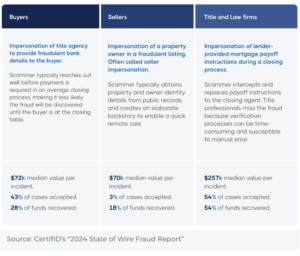Amid the rapid rise in real estate fraud, a new report reveals what consumers expect from their agents when it comes to protection.
Home buyers and sellers say they’re not getting enough warnings about the risks of wire fraud and other scams targeting real estate transactions, and they want agents to educate them more about protection, according to CertifID’s newly released 2024 State of Wire Fraud study.
Sixty percent of consumers say they received little to no education about real estate fraud from their agent, title agency or attorney, according to the survey, based on responses from 650 consumers who recently bought or sold a home. The majority of respondents—71%—say it’s “someone else’s responsibility” to educate them about wire fraud. They have the highest expectation for real estate agents to provide that information.
“Whether it feels like we’re talking about it a lot as an industry or not, that message is somehow getting lost and not ending up with the consumer,” says CertifID CEO Tyler Adams. “Take an extra five minutes at the beginning of a transaction to tell your clients that there is a chance that fraud could be interjected in this transaction at any point. It’s a difficult conversation to have. But it is way worse to reach the very end of a transaction and your client shows up at closing to find out they wired their money to a fraudster three days prior. They’ll never get their money back, and no one is able to help save the day. This is what is occurring.”
Adams says cybercrime in real estate transactions is one of the fastest-growing types of crimes in the United States. “And we’re just not talking about it enough for consumers to be aware,” he says. “I think there will be a reckoning to come if we don’t because consumers eventually will sue everybody involved. They’ll say: ‘You’ve done 100 of these transactions and I’ve done one in the last 10 years. A fraudster took your email credentials and sent me fake emails that resulted in me losing my entire life savings.’”
Twenty-two percent of the fraudulent communication from scammers is made to appear like it’s coming from the real estate agent in a transaction, according to CertifID’s report. And because of that, there’s a growing number of lawsuits accusing real estate professionals or others in the transaction for not adequately warning clients. In one case from 2018 (Bain v. Platinum Realty LLC), a Kansas court found a real estate agent and her brokerage liable after a buyer was forwarded fake wire instructions that appeared to come from the agent. The buyer lost $196,622. The agent denied ever sending the fraudulent email. A jury found the agent and her brokerage 85% liable and ordered them to pay the buyer $167,129 in lost funds. A federal court upheld the verdict.
Scams Are Rising: 1 in 4 Face Threats
The latest data shows real estate scams may be more common than you think: Nearly one in four consumers say they were targeted by fraud attempts during the real estate closing process, according to CertifID’s report. More than one in 20 consumers became victims last year. The median amount they lost exceeded $70,000, whether that was buyers whose down payments were stolen or sellers who lost their net proceeds to fraud.
Real estate is especially vulnerable to fraud because data is readily available about property listings via MLS and county records; transactions involve large sums of money; and up to 10 different parties could be involved in and sharing information about the closing, the report warns.

Have the Hard Conversation
Go beyond just including a warning of the potential for wire fraud in your email signature. “It’s a nice start—but it’s not enough,” Adams says. “We need to be adding fraud warnings into our agreements and contracts, adding resources to our websites and discussing it verbally with our clients.” Here are some tips to protect you and your clients:
- Have face-to-face conversations with clients to clearly explain the risks. Urge them to always call and verify wiring instructions they receive by contacting a known person through a trusted phone number (not the phone number provided in an email with the wire instructions).
- Consider adding a disclosure form as a risk management tool for your brokerage. Several companies have developed a wire fraud disclosure form that real estate pros can use to warn clients about cybercrime risks. View sample forms.
- Adopt greater security precautions to safeguard your transactions. Check out the National Association of REALTORS®’ cybersecurity checklist and consider using it in your transactions.
